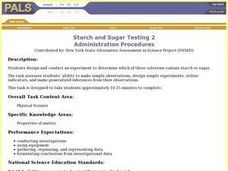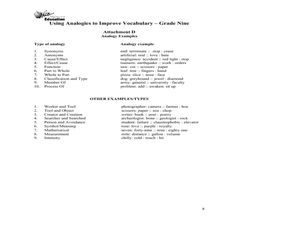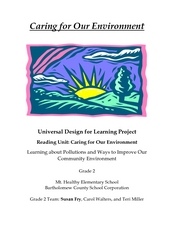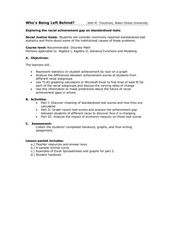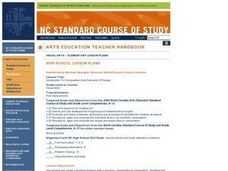Curated OER
Like A Good Neighbor
Second graders discuss the characteristics that make a neighborhood. As a class, they create a KWL chart assessing their knowledge about neighborhoods. Students develop a list of rights and responsibilities of good neighbors and...
Curated OER
Identifying Creatures
Young scholars use a classification key from a provided worksheet to identify creatures. This task assesses student's abilities to interpret data, make decisions, identify, and classify.
Curated OER
Starch and Sugar Testing 2
Students design and conduct an experiment to determine which of three solutions contain starch or sugar. This task assess students' ability to make simple observations, design simple experiments, utilize indicators, and make generalized...
Curated OER
Heating Crystals
Students examine the effects of heating on various crystals. They answer questions in the observation category which assess their ability to use a variety of senses to observe data in a certain way- a scientific way.
Curated OER
Changing Rocks
Students shake a box containing Plaster of Paris "rocks", gravel, and sand, to measure the effects of erosion. They work individually during this exercise. This task assesses students' abilities to make simple observations, describe...
Curated OER
Ocean Botttom Profile
Students interpret a graph of ocean depths and topographic features. This task assesses students' abilities to interpret figures, organize and represent data, apply knowledge of scale to a profile, and apply theoretical knowledge.
Curated OER
Peat Pots
Young scholars place a peat pot in water to observe and calculate the rate of capillarity in a model of a soil. This task assesses students' abilities to make simple observations, collect, record, and represent data, use a data table to...
Curated OER
The Blizzard of 1993
Students read and interpret the information from a barograph from a major winter storm. This task assesses students' abilities to interpret and analyze graphs, construct data tables and graphs, generalize, infer, apply knowledge of...
Curated OER
Geo Jammin' By DeSign - Day 1, Lesson 1: Math in Motion
Second graders, through large screen monitor, study geometric design. They participate in a diagnostic assessment in which they use pnecils, scissors and paste.
Curated OER
Photosynthesis
Seventh graders investigate a multidisciplinary unit with an emphasis in using technology in order to engage them. The students perform Internet research about photosynthesis with a written assessment taken from the WebQuest.
Curated OER
Rolling Down Hill
Students perform an experiment, collect, and analyze data of a rolling marble down a ramp. They report results after they complete their experiment. Students are assessed in science and writing.
Curated OER
Snell's Law
Students determine whether the index of refraction of sample of Corn Syrup meets Federal standards. This task assess students' abilities to explain the procedures for investigation, plan for recording and organizing observations and...
Curated OER
Using Analogies to Improve Vocabulary
Ninth graders analyze the relationships for pairs of words in analogical statements to infer word meanings. In this word meanings lesson, 9th graders complete an analogy pre-assessment, study a chart for using analogies to improve...
Curated OER
Caring for Our environment
Second graders study the environment by reading and discuss information on pollution in the texts. For this environment lesson students read Wicker School Takes Action, and City Green and discuss what we do with our trash. ...
Curated OER
Science Investigation Using Water Quality
Eighth graders conduct an experiment that analyzes the physical and chemical characteristics of various water samples. They discuss the procedures and safety concerns for the water test, and test their water samples to determine if they...
Curated OER
Who is Being Left Behind?
Students investigate scores as they relate to race. In this algebra lesson, students analyze standardized scores and how race can affect these scores. They plot their findings on a graph and draw conclusions.
Curated OER
What Makes A Good Speaker?
Students write a response to a diagnostic assessment determining what they need to work on to become good public speakers. They listen to the Dr. Martin Luther King Jr. speech, I Have A Dream, and identify what makes a good speaker.
Curated OER
1862 MARYLAND CAMPAIGN, AMERICAN CIVIL WAR
Students explain why General Robert E. Lee decided to invade Maryland in September 1862; review the major events of the Maryland Campaign of 1862; describe the major events of the three phases of the Battle of Antietam; and assess the...
Curated OER
The ABCs of Citizenship
In this instructional activity, students read the book that focuses on the ascpects of citizenship/ Students imagine a scene in which each statement is actually happening. Students descirbe rights, repsonisbilities. Assess students by...
Curated OER
"Viennese Musical Clock"
Fourth graders learn about musical patterns as they play a game called fudge. Students are assessed based on whether they were able to identify and play a steady beat, use the appropriate form, and clap the rythmic patterns.
Curated OER
Conditional Statements
Students are introduced to the topic of proofs in Geometry. During a PowerPoint presentation, they take notes on indirect proofs and have groups of students write a true statement. They are assessed on the statement and how well they...
Curated OER
Exploring Pottery of North Carolina
Eighth graders explore the pottery traditions of North Carolina through a progression of investigation and hands on experience. State Standards are addressed during this two to three week lesson on regional pottery techniques.
Curated OER
Introduction To Composition And Elements Of Design
Young scholars create a finished drawing with a dynamic, asymmetrical composition. Pencil sketches are encouraged for final projects. Students assess their own work prior to submitting the artwork.
Curated OER
Acrostic Poems: What's In a Name?
Students find words that begin with the letters in their own names, using a variety of sources including word banks and online dictionaries. They create an acrostic poem. Pupils revise poems as needed, for meaning and conventions. ...


